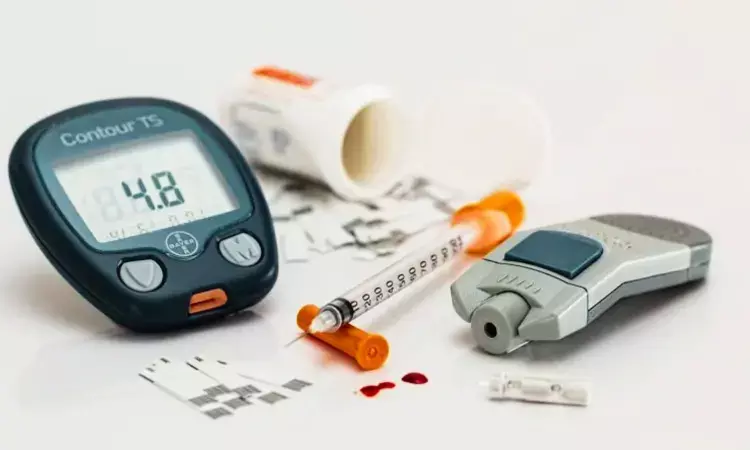- Home
- Medical news & Guidelines
- Anesthesiology
- Cardiology and CTVS
- Critical Care
- Dentistry
- Dermatology
- Diabetes and Endocrinology
- ENT
- Gastroenterology
- Medicine
- Nephrology
- Neurology
- Obstretics-Gynaecology
- Oncology
- Ophthalmology
- Orthopaedics
- Pediatrics-Neonatology
- Psychiatry
- Pulmonology
- Radiology
- Surgery
- Urology
- Laboratory Medicine
- Diet
- Nursing
- Paramedical
- Physiotherapy
- Health news
- Fact Check
- Bone Health Fact Check
- Brain Health Fact Check
- Cancer Related Fact Check
- Child Care Fact Check
- Dental and oral health fact check
- Diabetes and metabolic health fact check
- Diet and Nutrition Fact Check
- Eye and ENT Care Fact Check
- Fitness fact check
- Gut health fact check
- Heart health fact check
- Kidney health fact check
- Medical education fact check
- Men's health fact check
- Respiratory fact check
- Skin and hair care fact check
- Vaccine and Immunization fact check
- Women's health fact check
- AYUSH
- State News
- Andaman and Nicobar Islands
- Andhra Pradesh
- Arunachal Pradesh
- Assam
- Bihar
- Chandigarh
- Chattisgarh
- Dadra and Nagar Haveli
- Daman and Diu
- Delhi
- Goa
- Gujarat
- Haryana
- Himachal Pradesh
- Jammu & Kashmir
- Jharkhand
- Karnataka
- Kerala
- Ladakh
- Lakshadweep
- Madhya Pradesh
- Maharashtra
- Manipur
- Meghalaya
- Mizoram
- Nagaland
- Odisha
- Puducherry
- Punjab
- Rajasthan
- Sikkim
- Tamil Nadu
- Telangana
- Tripura
- Uttar Pradesh
- Uttrakhand
- West Bengal
- Medical Education
- Industry
Fall in death rates after first heart attack in people without diabetes, or with type 2 diabetes, not for type 1 diabetes

Sweden: A recent study revealed falls in the death rates of both people without diabetes and those with type 2 diabetes, but not those with type 1 diabetes following a heart attack. The findings are to be presented at the 2023 Annual Meeting of the European Association for the Study of Diabetes (EASD) in Hamburg, Germany (2-6 October).
The researchers reported that during the last 15 years, the risk of death and major cardiovascular events in people without diabetes and with type 2 diabetes after having a first-time heart attack has decreased significantly. In contrast, this decreasing trend was absent in people with type 1 diabetes.
Earlier studies have shown that people with diabetes have a worse outcome after heart attacks (myocardial infarction [MI]), compared to people without diabetes. In contrast, recent studies have shown a substantial decline in overall mortality and cardiovascular (CV) outcomes among people with diabetes. However, trends in survival after a first heart attack in people with diabetes and without diabetes have still not been extensively studied.
Dr Linn Glynn, Karolinska Institutet, Stockholm, Sweden, and colleagues identified, using data from between 2006 to 2020, 2,527 individuals with type 1 diabetes (T1D), 48,321 individuals with type 2 diabetes (T2D) and 243,170 individuals without diabetes with a first heart attack in national healthcare registries. The outcomes measured were trends in survival, (overall mortality and cardiovascular [CV] death), and major cardiovascular events (MACE), meaning the combined outcomes of non-fatal stroke, non-fatal MI, CV death and hospitalised heart failure. Computer and statistical modelling were used to establish any variations in these outcomes.
Individuals with T1D were younger (62 years,) and more often women (44%) compared to individuals with T2D (75 years,) women (38%), and to the control group without diabetes (73 years) women (38%). Three-year trends in death, CV death and MACE between groups are shown in the full abstract.
During follow-up and after multiple adjustments (sex, age, comorbidities, socioeconomic factors and medication) there was a significant decreased annual incidence trend for all cause death in control group (-1.9% per year) and individuals with T2D (-1.3% per year) with no such trend in individuals with T1D (no change). Corresponding numbers for CV death were for control group -2.0% per year, T2D -1.6% year, and T1D -0.5% per year, but the result for T1D was not statistically significant. For MACE, incidence in the control group fell by 2.3% per year, T2D by 1.9% per year and T1D by 0.6% per year, but again the result for T1D was not statistically significant.
Discussing potential reasons for the findings, the authors say that the standard care following a heart attack has improved with more availability of, for example percutaneous coronary intervention and better overall medical treatment. However, this standard of care should have improved in all three groups.
In this study population, the authors say that people with T1D had a longer duration of diabetes and a higher mean glycated haemoglobin (a measure of the average blood sugar level over the past 3 months) than people with T2D, which might have an impact on the risk of developing a heart attack as well as the prognosis following a heart attack.
The authors conclude: “During the last 15 years, the risk of death and major cardiovascular events in people without diabetes and with type 2 diabetes after having a first-time heart attack has decreased significantly. In contrast, this decreasing trend was absent in people with type 1 diabetes. Our study highlights the urgent need for understanding the cardiovascular risk in people with T1D.”
Reference:
Death rates following first heart attack have gone down for those without diabetes or with type 2 diabetes, but not for type 1 diabetes, Diabetologia, Meeting: Annual Meeting of the European Association for the Study of Diabetes (EASD).
Dr Kamal Kant Kohli-MBBS, DTCD- a chest specialist with more than 30 years of practice and a flair for writing clinical articles, Dr Kamal Kant Kohli joined Medical Dialogues as a Chief Editor of Medical News. Besides writing articles, as an editor, he proofreads and verifies all the medical content published on Medical Dialogues including those coming from journals, studies,medical conferences,guidelines etc. Email: drkohli@medicaldialogues.in. Contact no. 011-43720751


